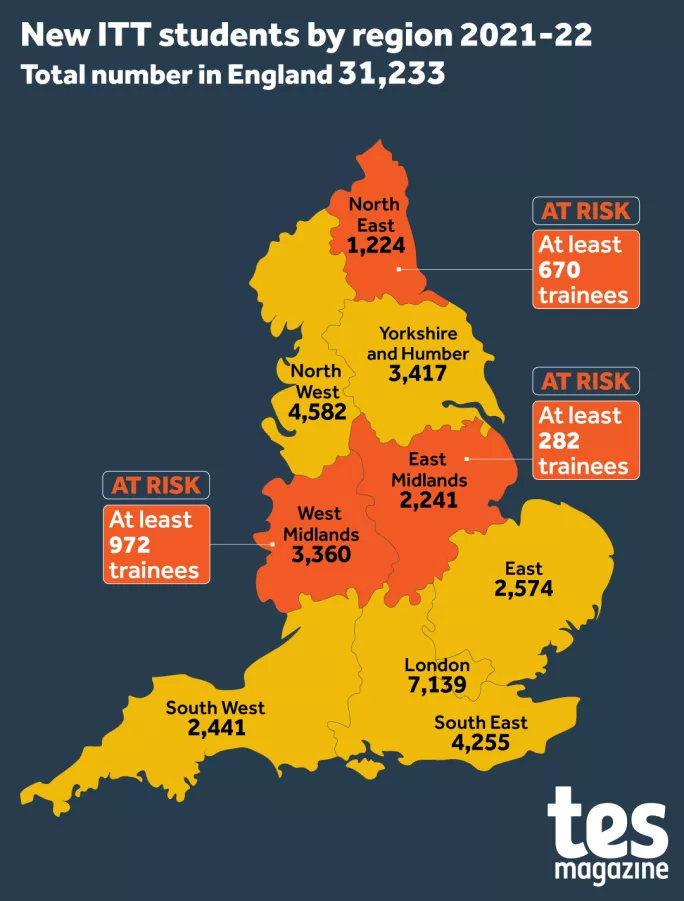Fear of new teacher ‘supply deserts’ in ITT shake-up

Teacher training provider “deserts” could further disrupt the flow of new teachers into key parts of the country as a result of the shake-up of initial teacher training providers, teacher training and teachers’ leaders have warned.
After just over a third of teacher training providers who took part survived the first round of reaccreditation, sector leaders are warning that the biggest reorganisation of initial teacher training (ITT) in 10 years could leave a “void” that could be “deeply damaging to the training pipeline”.
The warnings come after the results of the first round of accreditation showed that only 80 providers were successful.
- Teacher training: Almost two-thirds of providers not accredited in first wave
- Ofsted: 46 per cent of new ITT inspection judgements less than ‘good’
- ITT: £650-a-day advisers to ensure ‘smooth market exit’ for providers
- Training: ITT applications plummet by 24 per cent
The new accreditation process for all initial teacher education (ITE) providers was first announced last year in what was seen as a controversial shake-up of the sector.
The process means providers that plan to continue providing ITT from 2024-25 have two chances to pass.
At the deadline for the second round last Monday many of those providers that failed at the first round will have resubmitted applications.
Teacher training provider ‘deserts’
Following the first round, there are areas where ITE provider “deserts” could lead to the loss of hundreds of teacher trainee places, potentially adding even greater pressure during a growing teacher recruitment crisis.
Currently, for higher education institutions (HEIs), desert areas include the Midlands, Lincolnshire and the North East, Tes understands.
Tes anaylsis reveals that trainee places in the West and East Midlands as well as the North East could be most at risk based on the culling of providers during the first round of accreditation.
Tes compared Department for Education figures on trainee intake for the 2021-22 academic year with the number of trainees undertaking courses at providers understood to have failed at the first round.

The figures reveal that the West Midlands, in particular, could be at risk of losing a number of trainee places, as currently at least 29 per cent of the trainee places in the region could be lost.
James Noble-Rogers, chief executive of the Universities Council for the Education of Teachers, is concerned that these “deserts” could lead to a “broken” supply chain.
Mr Noble-Rogers said that if the gaps remain after round two, schools in those areas “will not be able to recruit the early career teachers they need in order to teach their pupils”.
He added that there was “no point” in the government saying that prospective teachers can “train somewhere else”, given that individuals were “increasingly wanting” to train near to where they live due to “family”, “financial” and other reasons.
“We would also risk losing the teachers who choose PGCE programmes at the same HEIs as where they did their undergraduate degrees,” he said.
“That teacher supply pipeline will be broken forever.”
His concerns are echoed across the sector.
“That teacher supply pipeline will be broken forever”
Emma Hollis, executive director of the National Association of School-Based Teacher Trainers (NASBTT), said it was difficult for her to determine where the deserts currently are, but she said they are a definite risk.
She said that although more providers are expected to pass round two, as it stands there remains a significant risk that there will be some regions left unserved.
Ms Hollis is also concerned about “supply issues across subject and phase”.
She said her main concern was that the DfE had not put anything in place to prevent this from happening.
“It feels like the accreditation process was launched with no planned outcome should there be a supply issue at the other end, despite this being flagged as a risk by us and others,” Ms Hollis added.
She said this oversight was “irresponsible” and that it was “not a safe strategy” in terms of supply. However, she added that she believes the majority of providers have a “good chance” of getting through the next round.
Risk of damaging the ‘training pipeline’
Sara Tanton, deputy director of policy at the Association of School and College Leaders (ASCL), said that the market review was taking place at a time “when we already have a teacher recruitment crisis”.
She warned that it could leave a “void” that could be “deeply damaging to the training pipeline”.
Ms Tanton said that while her union “fully supports the principle of ensuring high-quality training”, the ITT shake-up appeared to be “driven by a desire to have all providers following a DfE-approved pedagogical approach”.
And Jonny Uttley, chief executive officer of The Education Alliance trust, which runs TEAL SCITT (which passed the accreditation process at the first round), told Tes that this interruption of the pipeline could “potentially be a really significant problem unless a lot more providers get though in the second round”.
He said he thought the push for reaccreditation had been “too radical a change...too quickly”.
Mr Uttley said that unless a “really significant” number of providers pass the second round, it will be “difficult to imagine” that there won’t be “cold spots” across the country.
He also said that “some people have been slow to understand” the “importance” of the small and medium-sized SCITTs (school-centred ITT providers) that have “filled the gaps in cold spots”, and that this is where the issues could appear.
High number applying for round two
Despite concerns, there are indications that the number of providers going for accreditation in round two is still high.
Ms Hollis told Tes that her organisation sent out a poll to its members soon after the first-round results were released.
Some 95 per cent of the members that responded that were unsuccessful in round one (60 providers) said they would be applying again, and just three said they had not yet decided.
When the DfE announced that providers that failed to pass round one would only be required to resubmit on areas they failed on, the sector responded with relief.
However, the deadline for the second round of accreditation came at one of the busiest times of the year for providers as they prepare to get trainees through their final steps.
And Mr Noble-Rogers said that this time around was “even more stressful for providers than it was in round one”.
He said it was a busy time of year, alongside “the stress they will be feeling because this might well be their last chance to keep their accreditation”.
“Providers are already under huge pressure from the threat of what are often combative Ofsted inspections, shortages of placements and recruitment challenges. I really do fear for the mental health and wellbeing of people in the sector,” Mr Noble-Rogers added.
Ms Hollis said that round one was a tricky time for applications to be taking place.
This time around, she thinks there is a “little bit more time” but that providers have “still not had sufficient time”.
Back in December, Tes revealed that the DfE planned to give teacher training providers that faced an Ofsted inspection in the new year longer to apply for accreditation.
Caution over partnerships
Under the current plans, providers that fail to become accredited could partner up with their accredited counterparts and deliver the latter’s curriculum.
Nationwide provider Teach First told Tes that it is currently working on a pilot to partner with providers that have decided not to progress with ITT accreditation or that are unsuccessful.
The provider hopes to launch the pilot in 2023-24 and is working on the specifics of what this partnership will look like.
Mr Uttley said that his provider is “likely to have to wait until the DfE publishes the list of successful providers” after round two, “but we will certainly be wanting to connect with anyone unsuccessful who wishes to work with us”.
But he added that some providers that have a “track record” of delivering teacher training could want to be “quite selective” about who they form partnerships with.
He said some might be “reluctant” and “some will inevitably exit the market”.
But Ms Hollis said that NASBTT is still encouraging people to apply in round two even if they plan to form partnerships.
She said she doesn’t want to see providers “forced into partnerships” that “do not fit the needs of their communities”.
She said that forming partnerships takes a “significant amount of time” and that she feels the DfE has “almost made it impossible” to form those partnerships in the time given.
But she said that she hoped the DfE would not try to “impose” partnerships and that it is important to remember that it’s not “one size fits all”.
The results of round two are expected to be published in the early autumn.
There have been suggestions that a round three could be held that could involve more providers being accredited. However, the DfE has said that it does not expect this to run before the 2024-2025 academic year.
You need a Tes subscription to read this article
Subscribe now to read this article and get other subscriber-only content:
- Unlimited access to all Tes magazine content
- Exclusive subscriber-only stories
- Award-winning email newsletters
Already a subscriber? Log in
You need a subscription to read this article
Subscribe now to read this article and get other subscriber-only content, including:
- Unlimited access to all Tes magazine content
- Exclusive subscriber-only stories
- Award-winning email newsletters
topics in this article



